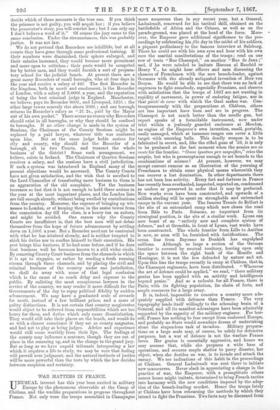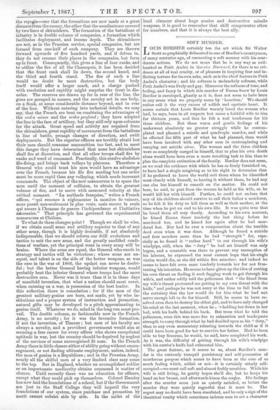WAR MATTERS IN FRANCE.
UNUSUAL interest has this year been excited in military Europe by the phenomena observable at the Camp of Chalons, and the warlike preparations in progress throughout France. Not only were the troops assembled in Champagne more numerous than in any recent year, but a General, Ladmirault, renowned for his tactical skill, obtained on the battlefields of Africa and the Crimea, as well as on the parade-ground, was placed at the head of the force. More- • over, the Emperor gave additional significance to the pro- ceedings by celebrating his fete day in the midst of his soldiers, a piquant preliminary to the famous interview at Salzburg. There he could see with his own eyes and hear with his own ears the martial manifestations of the troops ; read on one row of tents "Rue Chassepot," on another "Rae de Jena ;" and, if he were minded to imitate Haroun al Raschid or. Henry V., he might hear officers and men discussing the chances of Frenchmen with the new breech-loader, against Germans with the already antiquated invention of Herr von Dreyse. He would be able to see that there was no lack of eagerness to fight somebody, especially Prussians, and observe with satisfaction that the troops of 1867 are not wanting in rapidity of movement, in power of enduring fatigue, nor in that gaiete de cceur with which the Gaul makes war. Con- temporaneously with the preparations at Chalons, others not less important have been and are in progress. The Chassepot is not much better than the needle gun, but report speaks of a formidable instrument, now under trial within a jealously guarded enclosure at Meudon, an engine of the Emperor's own invention, small, portable, easily managed, which at immense ranges can cover a little target with unerring balls. This deadly weapon is to be fabricated in secret, and, like the rifled guns of '59, it is only to be produced at the last moment when the armies are en route for the frontier. " °lane ignoturn pro magnifico," cries the sceptic, but who is presumptuous enough to set bounds to the combinations of sciences At present, however, we may accept current rumour as an illustration of the yearning of Frenchmen to obtain some physical means wherewith they can recover a lost domination. In other departments there has not been less activity. Every fort and fortress in France has recently been overhauled, inspected, reported on, condemned as useless or preserved in order that it may be perfected. New works even have been constructed, and upwards of a million sterling will be spent on strongholds and entrenched camps in the current year. The famous Troll& de Belfort is the site of an entrenched camp which now closes the road from Bale to Paris. Soissons, so important from its strategical position, is the site of a similar work. Lyons can now boast of an " entirely new and complete system of defence," and at Grenoble, in front of Lyons, vast works have been constructed. The whole frontier from Lille to Antibes is now, or soon will be, furnished with fortifications. The ocean line from Bayonne to Dunkirk has engulphed millions. Although so large a section of the German frontier is covered by neutral territory, leaving open only the space between the right bank of the Moselle and Huningue, it is not the less defended by nature and art. Upon this line the troops recently in camp at Chalons, that is, the Chassepot regiments, have been distributed. " Wherever the art of defence could be applied," we read, " there military genius has been applied with an activity and intelligence beyond praise." And as' a redoubt for all France, there is Paris, with its fighting population, its chain of forts, and ample resources for a large army. It is, indeed, impossible to conceive a country more ade- quately supplied with defences than France. The very topography lends itself willingly to the scheming brain of a General, and all its manifest advantages have been admirably supported by the sagacity of the military engineer. For her- self, France has nothing to fear except from coalesced Europe, and probably no State would nowadays dream of undertaking alone the stupendous task of invasion. Military prepara- tions on a large scale may, of course, be solely for defensive purposes, but a war of defeice is not the warfare France loves. Her genius is essentially aggressive, and hence we may assume that, while she prepares a wide base of operations, and secures ample shelter to parry disaster, her object, when she decides on war, is to invade and attack the enemy. We see indications of this habit in the proceedings at Chalons. General Ladmirault was sent there to initiate new manceuvres. Never slack in appreciating a change in the practice of war, the Emperor, with a promptitude others nearer home might imitate, determined to bring French tactics into harmony with the new conditions imposed by the adop- tion of the breech-loading musket. Hence the troops lately at Chalons have been rehearsing the methods by which they intend to fight the Prussians. Two facts may be discerned from the repojits—one that the formations are now made at a great distance from the enemy, the other that the assailants are covered by two lines of skirmishers. The formation of the battalions of infantry is in double column of companies, a formation which facilitates deployment, and lessens depth. The skirmishers are not, as in the Prussian service, special companies, but are formed from one-half of each company. They are thrown forward upwards of five hundred yards, and if driven in, they do not resume their places in the companies, but form up in front. Consequently, this gives a line of four ranks, and to utilize the fire of all the Chassepots, it has been decided that the front rank shall lie down, the second kneel, and the third and fourth stand. The fire of such a line would • no doubt be most destructive, but the body itself would offer a larger mark, and a charge pushed with resolution and rapidity might surprise the front in dis- order. The reserves are drawn up far in rear of the line, the guns are grouped in masses, and the cavalry act in one body, on a flank, at some considerable distance beyond, and in rear of the line. Without entering into technical details, we may say, that the French are bent on combining the advantages of the ordre mince and the ordre profond ; they have adopted the line in the face of artillery, but they still rely upon columns for the attack. Great speed and activity are required from the skirmishers, great rapidity of movement from the battalions in line of battle, prompt changes of direction, and swift deployments. But the superior officers are terribly afraid lest their men should consume ammunition too fast, and to meet this danger they have determined that none but skirmishers shall fire at discretion, and that all other troops shall fire by ranks and word of command. Practically, this resolve abolishes file-firing, and brings back volleys by platoons. Therefore a General who could trust his men would have an advantage over the French, because his file fire needing but one order must be more rapid than any volleying, which needs incessant commands. The object of the new manoeuvres is to spare the men until the moment of collision, to obtain the greatest volume of fire, and to move with measured velocity at the critical moment. "La methode frangaise," writes a French officer, " qui renonce a reglementer la maniere de vaincre, nous paralt non-seulement la plus vraie, mais encore la seule qui assure a l'homme de guerre Findependance et l'initiative micessaire." That principle has governed the experimental manceuvres at Chalons.
To what do these changes points Though we shall be wise, if we obtain small arms and artillery superior to that of any other army, though it is highly desirable, if not absolutely indispensable, that we should reform our drill evolutions and tactics to suit the new arms, and the greatly modified condi- tions of warfare, yet the principal want in every army will be brains. Where the arms are equal, the General who excels in strategy and tactics will be victorious ; where arms are un- equal, and talent is on the side of the better weapons, as was the case in the war of 1866, the upshot can never be doubt- ful ; but the better General having inferior weapons, would probably beat the inferior General whose troops had the more destructive arm. Never was it truer than it is in these days of manifold invention, that what a nation should most covet, when entering on a war, is possession of the best leader. In this reflection there is consolation ; for if the men of the greatest military genius are born, not made, yet by wise in- stitutions and a proper system of instruction and promotion, natural gifts may be developed to a pitch approximating to genius itself. Whatever we do, mind in the long run must pre- vail. The double column, so fashionable now in the French Army, is no novelty ; for it was the favourite formation, if not the invention, of Timour ; but men of his faculty are always a novelty, and a provident government would aim at securing a free career for every officer who shows exceptional aptitude in war, lest the country should be deprived by neglect of the services of some unrecognized fit man. In the French Army there is little chance either of ability going without encou- ragement, or not finding ultimate employment, unless, indeed, the man of genius is a Republican ; and in the Prussian Army, nearly all the skilful men of a very limited class may come to the top. But in England, whether an accomplished soldier or an importunate. mediocrity obtains command is matter of chance. Until recently there was no education for officers, except what they could pick up themselves. Colonel Hamley has now laid the foundations of a school, but if the Government are just to the Staff College they will imperil the very foundations of our system, since purchase and promotion by merit cannot subsist side by side. In the midst of the loud clamour about huge armies and destructive missile weapons, it is good to remember that skill compensates often for numbers, and that it is always the best ally.































 Previous page
Previous page